Celebrating Postdocs: Here’s how they’re shaping the future
National Postdoc Appreciation Week is Sept. 19-23 this year. To celebrate the University of Florida’s postdoctoral scholars, read about their research across the state and how it is impacting Florida and the future.
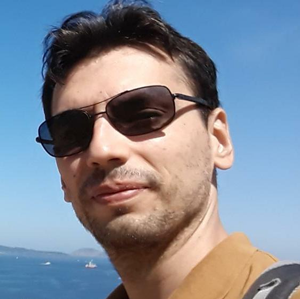
Diogo Cosenza, Ph.D.
UF/IFAS; School of Forest, Fisheries and Geomatics Sciences
Research:
I study applications of geotechnologies — such as satellites and drones — in the assessment of forest environments. I also study the impact of the Brazilian Amazon deforestation on the global environment. I develop tools to ease the assessment of forest environments and the assess impacts of deforestation in real-life tropical countries.
Why UF?
UF gave me the opportunity to connect to important people in these fields of work and the proper support to develop my potential.
What advice do you have for faculty mentoring postdocs?
It is important that postdocs receive guidance from their supervisors, while also giving autonomy to the postdocs and trusting in their capabilities. I believe this is the best way to develop their potential.
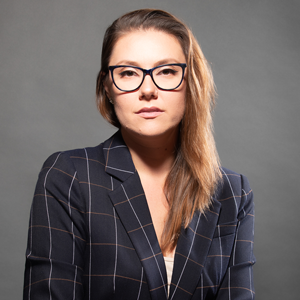
Flavia Tabay Zambon, Ph.D.
UF/IFAS; Horticultural Sciences Department - Indian River Research and Education Center
Research:
The grapefruit industry is shrinking by the day. The recovery of this important crop and iconic symbol of the Indian River region of Florida is at the core of the research I contribute to. I am responsible for planting and checking the growth of more than 12,000 grapefruit trees across the state of Florida. The Florida Department of Agriculture and Consumer Services, the Indian River Citrus League, the USDA and UF are all partners in this project. The main goal of this long-lasting trial is to test several combinations of scion and rootstock against the most deadly citrus disease ever found, citrus greening. Results from this huge trial will advise growers and the next generation of breeders to which combination is the best to be planted in the era of citrus greening, considering best yields, fruit and juice quality, and resilience to the disease.
Why UF?
I set foot at UF for the very first time at the Fifield Hall in August 2012 for a volunteer internship at the end of my bachelor’s degree in Brazil. At that time, I had no idea I would be back in two years for my Ph.D., nor that I would keep working at UF. UF gave me the resources and the opportunity to diversify my interests and to backup my will to keep doing science. It is somehow a weird feeling that you can brainstorm ideas, put them into paper and always have somebody or the team supporting your line of thought. And, don't get me wrong, the opposite is true as well. UF gave me that leverage I am proud to wear, not just because we are in the top 5 public universities, but because when I say to people I did my Ph.D. at UF, the growers listen to me. This is huge for an immigrant, female and Latina working in the agriculture sector.
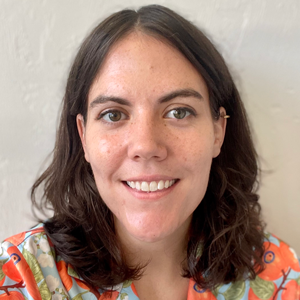
Mary Kate Koch, Ph.D.
College of Liberal Arts and Sciences; Department of Psychology
College of Medicine; Department of Health Outcomes and Biomedical Informatics
Research:
I am evaluating an intervention that aims to connect patients who have received terminal diagnoses to a greater sense of dignity and peace through narrating their life stories for loved ones. Specifically, I am looking at how differences in the ways in which people tell their life stories (e.g., How do they try to make meaning out of life events?) and differences in the interviewer’s communication style contribute to dignity and peace for patients.
Providing reliable resources to manage the emotional distress that often comes with a terminal diagnosis is a major challenge in healthcare. This research will improve our understanding of how to better deliver care that connects patients to their identity beyond a checklist of physical symptoms.
Was there a person or event that inspired you to do this work?
Growing up, I was a voracious consumer of stories. I would read anything: fiction, non-fiction, the back of cereal boxes. When I started to study psychology as an undergraduate, I learned about life-story research. The idea of how we remember our lives and narrate those events says a lot about who we are and where we’re going seemed like a natural fit for me. Since then, I have applied this approach to my work in many ways, but this specific work is possible because of a grant that Drs. Susan Bluck (Psychology) and Carma Bylund (Health and Bioinformatics) received through the National Cancer Institute.
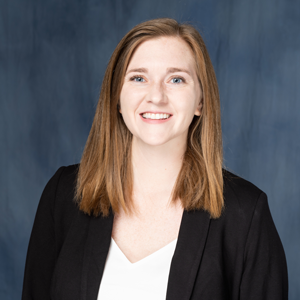
Emily Smail, Ph.D.
College of Medicine; Department of Health Outcomes & Biomedical Informatics
Research:
My research looks at two distinct but overlapping traits in older adults: mental health and mobility. Since the COVID-19 pandemic began, I’ve looked into how the pandemic impacts trajectories of mental health and substance use over time, and how people’s behaviors have changed in response to the pandemic. I’ve worked with a team to develop a survey that will soon be deployed to measure the pandemic response in older adults living in North Florida. I also study the prevention of both mental distress and mobility decline. To study mobility, I’m part of a team that uses smartwatches to assess mobility in real-time using an application that tracks risk factors for mobility decline. This technology can be used to look at patterns of behavior before, during and after a fall.
My research can be used to understand how a stressful event (such as a pandemic) impacts public mental health. In addition to learning about how the prevalence of mental distress and substance use rises and falls, this information can be used to create targeted responses in future health threats. For mobility, as the smartwatch technology evolves, user profiles can be studied in depth to develop risk profiles and intervention targets for mobility decline. We hope this can be used to reduce morbidity and mortality associated with poor mobility.
What advice do you have for faculty mentoring postdocs?
The postdoc experience is wildly different based on career goals, but universally, I think it’s most important that mentors be available to their postdoc. Weekly meetings are a great way to provide structure and allow the postdoc to progress through their career goals by allowing them space to express their goals and opinions without judgment.
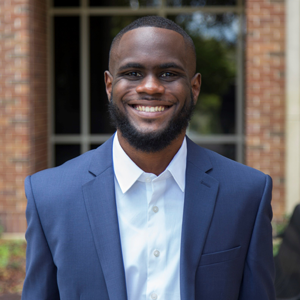
Keon Wimberly, Ph.D.
College of Health and Human Performance; Department of Applied Physiology & Kinesiology
Research:
My research focuses on understanding and defining the molecular mechanisms behind muscle wasting, functional decline and frailty in older adults. Physical frailty is a clinical state associated with an individual’s increased risk of dependence or mortality when exposed to a stressor and has emerged as a major predictor of poor health outcomes in the elderly and other susceptible populations (smokers, patients with chronic kidney disease, etc). The research I contribute to looks to define the mechanisms that cause frailty. If we can define these mechanisms, we can generate novel and effective treatments.
Why UF?
UF is a place that is entrenched with world-class scientists who do groundbreaking research across broad fields. I received my Ph.D. in Genetics & Genomics at UF and was trained as a molecular geneticist. I was able to take the knowledge and skills I gained as a grad student and apply it to my postdoctoral research, which takes a more “whole body” or “physiological” approach to address critical questions about human life and health. There are very few places in the world that have all of the resources UF has in one place!
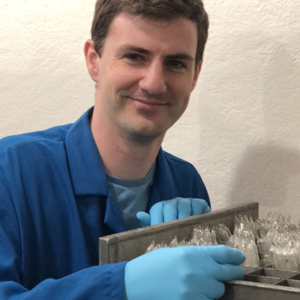
Edward Kalkreuter, Ph.D.
UF Scripps Biomedical Research; Department of Chemistry
Research:
My research contributes to the exploration and continuous development of one of the world's largest bacterial collections, the UF Scripps Natural Product Discovery Center (NPDC), which contains more than 120,000 bacterial strains. These strains have been collected since the 1940s based on their predicted ability to produce natural products, which are specialized compounds evolved by nature to confer some advantage. These types of natural products have given us most of our anti-cancer and antibiotic drugs. As DNA sequencing technology has advanced, it is revealing that the genomes of some bacteria have far more diversity within them than previously thought, meaning there's huge potential for the discovery of new compounds that could benefit humanity. Some of the best natural product producers for this purpose are actinobacteria, but there's minimal information about the important bacteria in public DNA databases. A major goal of the project I work on is developing the UF Scripps Natural Product Discovery Center database into a resource that could revolutionize the field of drug discovery by significantly increasing the known actinobacteria genomic data available to science. It's a truly multidisciplinary effort from our lab, with huge contributions from research technicians, graduate students, postdocs, staff scientists, and our principal investigator, Ben Shen, Ph.D.
By unlocking the genomic information of our strain collection and making that data and the strains themselves available to the scientific community, we can accelerate the discovery of new cancer treatments, antibiotics or other important medicines. The odds are that the next blockbuster drug is produced by one of our bacteria. We expect that this collection will become a major resource for the research community.
Why UF?
We do most of our genome sequencing using UF cores. UF and UF Scripps have been instrumental in their support and promotion of our work. With the focus on drug discovery at UF Scripps, we have been able to launch several collaborations to leverage the NPDC collection for real-world solutions to pressing societal needs.
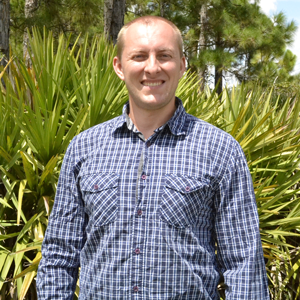
Marek Szczepanczyk, Ph.D.
College of Liberal Arts and Sciences; Department of Physics
Research:
In classical astronomy, astronomers observe the sky using light from stars, galaxies or bright stellar explosions. In the newly formed field of gravitational-wave astronomy, we listen to violent phenomena that do not emit light and cannot be measured by astronomical instruments. The gravitational waves are "ripples of spacetime," analogously to a stone tossed to a calm water surface, creating ripples propagating in every direction. In 2015, I was one of 1,200 scientists who discovered — for the first time — gravitational waves resulting from a collision of black holes, which have such strong gravity that even light cannot escape them. Since then, we have observed a surprising number of these collided black holes and have also discovered collisions of stars that are extremely dense and heavy. In my field, we observe the sky and achieve a deep understanding of nature. For example, our discoveries finally allowed us to understand how gold was created. We are waiting to detect the inner engine of a spectacular star explosion or even exotic hypothetical objects such as cosmic strings. With every discovery, we are checking whether Einstein is right with his theory of gravity, and so far, all his predictions are correct.
Was there a person or event that inspired you to do this work?
It's Albert Einstein himself. His theory of space, time and gravity triggered my great curiosity in my teens. This curiosity has not yet been satisfied, and likely, it cannot be fulfilled. I am all about gravity and its impact on spacetime. I want to explore experimentally the concepts of the bending of space, slowing or speeding up of time or the ripples of spacetime. I want to work on the homework left by Einstein.
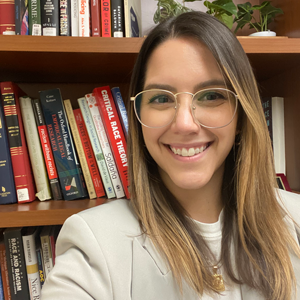
Vanessa Miller, J.D., Ph.D.
Levin College of Law; Law, Race and Crime Center for Justice
Research:
My research currently focuses on the intersection of law, education and race. Specifically, I study how traditional legal norms and principles (i.e., principles like reasonableness, safety, equality) hinder racial equity in schools. I am currently focusing on campus policing, race in the curriculum, education for those incarcerated and critical legal theory.
Race is consequential in society because it is used to create and justify systems of inequality. My research focuses on ways to expose and challenge the way race is used to maintain laws and policies relating to education in hopes of furthering institution goals of equity.
What advice do you have for faculty mentoring postdocs?
I feel so privileged to be mentored by Professor Katheryn Russell-Brown. She allows me to work on projects at my own pace while guiding me throughout the process. I suggest faculty mentors get to know their postdocs in meaningful ways. Get to know their personal and professional goals, preferred mentoring style and working conditions that allow them to flourish as a professional researcher.
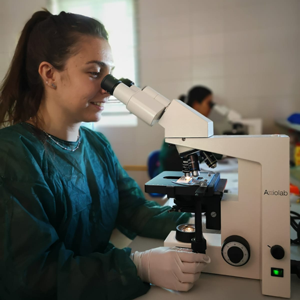
Marta Reguera Gomez, Ph.D.
College of Dentistry; Department of Oral Biology
Research:
My research is focused on the biology of Cryptococcus neoformans, a fungus that invades the brain in immunocompromised patients. I am studying the mechanisms by which it can reach the central nervous system and how it affects different cell types of the brain (such as neurons) once it has colonized it.
By knowing the factors that influence the entrance of the fungus in the brain, new therapies or preventive treatments can be developed, improving the prognosis of the infection.
Why UF?
My principal investigator is one of the top experts in the field which translates into cutting-edge research. Moreover, UF opportunities are endless. The university organization and infrastructure is exemplary, and it offers numerous resources for postdocs to perform high-quality research as well as develop our future career.
